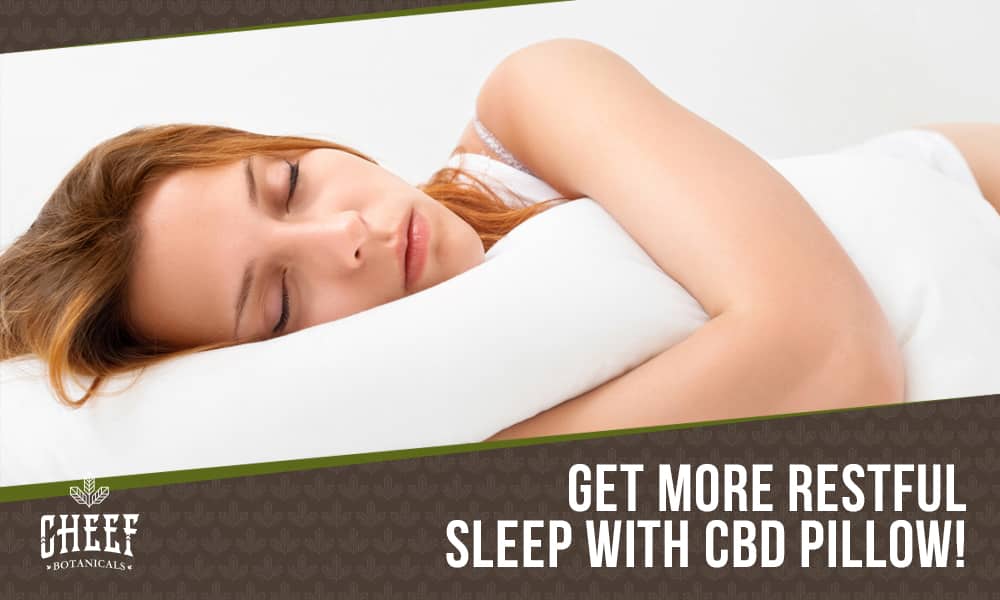Does CBD Help You Sleep Better?
Trouble sleeping is a more common issue than most think. Getting quality rest is crucial to a person’s overall health. Eventually, a lack of healthy sleep can lead to mental and physical exhaustion. If you’re searching for a natural solution or sleep aid, CBD might be the
answer to your sleep problems. To help you decide if CBD is right for you, let’s go over how CBD and sleep work individually and also together.
How Does CBD Work?
Cannabidiol (CBD) is a non-intoxicating, natural compound in the hemp plant. It’s just one of more than 100 cannabinoids in the cannabis plant. CBD is actually the second most abundant cannabinoid, next to THC. However, it seemingly produces the opposite effects on THC. Research suggests that CBD may even counteract and reduce the high THC produces.
CBD is generally well-tolerated by adults, children, and pets! It’s thought of as a fantastic tool that promotes balance in the
endocannabinoid system (ECS), which all humans have.
The ECS is a fairly complex network of neurotransmitters and cell receptors (cannabinoid receptors) that allow the body to maintain homeostasis. Homeostasis is how the body maintains stability despite external or internal changes.
Cannabinoid receptors are all over the body. However, the largest concentrations exist in our immune, central, and peripheral nervous systems. So, the ECS plays a large role in helping each of these systems communicate. The ECS also helps regulate a wide range of functions and processes in the body, like hunger, sleep, digestion, mood, and other things of that nature.
When your health encounters a stint, the ECS usually swoops in and releases its endocannabinoids to help restore balance in the body. With that said, CBD can be an excellent addition to your wellness regimen.
How your body absorbs CBD depends on how you use or take it. It can be inhaled, applied topically, or ingested. That means CBD comes in a variety of forms, like
CBD vapes, full-spectrum CBD oil, CBD edibles, CBD lotion, and more.
Each method of application plays a huge role in how it makes you feel. To understand that, let’s get into some more specifics below.

How Does CBD Make You Feel?
How CBD makes you feel is a complex subject to tackle, because there is no one-answer-fits-all response. Since the body can absorb CBD in several ways, you may feel differently depending on a few things: how you take it, how much you use, the type of product, and how your body interacts with it.
There are three categories that all CBD products fall under, full-spectrum, broad-spectrum, and isolate. Each of these is wonderful in its own right considering you’ll still receive several benefits from CBD itself.
Depending on the type of CBD product and your wellness goals, some might be more effective than others. For example, topicals may help target discomfort in specific areas of the body, while a full-spectrum CBD oil can be used for a range of things.
Another factor to consider is the dosage amount you take.
In lower doses, CBD is thought to be more energizing, while higher doses may induce a state of relaxation.
Of course, you should also take into account that individual weight, diet, metabolism, genetics, current medications, and the quality of the CBD product will all have a hand in how CBD makes you feel.
Read this next: "How to Choose CBD Oil Products"
What Affects Our Sleep?
We know sleep is crucial to mental and physical health. Yet, many times it can be difficult to tell whether we’re getting enough good quality sleep. Knowing what gets in the way of a good quality snooze can help you optimize your sleep patterns for a better night’s rest.
To achieve healthy sleep, we should first take a look at a few things that commonly affect it. Here are some of the more common things that might be impacting your sleep.
Light
Light intake is one external factor that may affect sleep. Natural and synthetic light sources can affect people in two ways. It can directly make it harder for people to fall asleep, and it can also indirectly influence our internal clock, which gives us our preferred sleep schedule.
Light enters “light-sensitive” cells inside the retina of our eyes. These cells help the brain determine whether it’s daytime or nighttime, which influences our sleep times and patterns.
Thanks to technology and the surplus of electric light, we are constantly exposed to light at all times of the day. When light surrounds us in the evening it delays the process of our brain determining when it’s time to go to sleep.
The exposure to light and how it affects sleep can differ. However, it may very well have an impact on our internal clock and sleep patterns.
Jet Lag
Traveling to and from different time zones can lead to difficulty sleeping. Trying to sleep at times you’re not used to can be challenging since your internal clock already has a sleep time in the works.
Jet lag can also cause people to feel overly tired, disrupting how much and how often they sleep. Ultimately, this all leads back to light exposure and our internal clocks.
Health Conditions
There is a range of medical and psychological health reasons that may lead to trouble sleeping. Discomfort, nervousness, injuries, and other symptoms from various conditions can all disrupt a good night’s rest.
If your body and mind are not in a state of relaxation, it can be challenging to fall asleep or cause you to wake up throughout the night. When our bodies feel stress or danger our brains know to respond by waking up.
Even stress from daily activities can decrease a person’s chances of getting deep sleep. This can also lead to more REM sleep instead of deep sleep.

Substances and Medications
Chemicals and substances that stimulate or alter the body physiologically, like alcohol, caffeine, antihistamines, nicotine, antidepressants, and other prescription medications can affect sleep quality.
For example, the most commonly used stimulant, caffeine, temporarily blocks receptors in the brain that cause us to stay alert. However, that only lasts for a short period.
Caffeine typically decreases the chances of getting slow-wave sleep, leaving REM sleep as the only option. So, even if you do sleep after intaking certain chemicals that block your ability to rest, it can affect the type of sleep you get.
Related article: "What Happens When You Mix CBD and Caffeine? "
When you lose the ability to get quality sleep, it builds in your body. During the day, because of the light, your internal clock fights to stay awake. But, the longer you stay up, the harder it gets for your body to fight off the desire to sleep.
Eventually, your body gives out and causes you to crash. This all varies depending on a person’s tolerance, how much of the substance they had, the type of substance, individual sleep debt, and their internal clock, among other things.
Your Sleep Environment
This is one you might not think about too often. Your sleep environment can affect your sleep quantity and quality. Some factors that can get in the way are noise, light, and temperature.
All of these variables can physically affect how at ease your body feels. If it’s too much or too little of something, your body may experience discomfort and stress leading to low-quality sleep.
Sleeping at a temperature that feels ideal is one of the best things you can do to optimize your bedroom environment. Reducing light and noise when you sleep can also be beneficial to your sleep.
Can CBD Help You Sleep?
Cannabidiol is a natural substance that interacts seamlessly with the ECS to produce a range of therapeutic effects. With that said, several elements of CBD may help a person sleep better.
Some studies suggest that CBD may act on serotonin receptors, which play a vital role in regulating a person’s sleep-wake cycle. Other research shows that CBD may help reduce nerves and discomfort, which tend to affect a person’s sleep.
One of the major therapeutic effects of CBD is how it may help relax a person. CBD is great at promoting a calm sense of well-being in a person’s body and brain.
Although research on CBD and sleep is still in the early stages, there are several studies on how CBD may help with the individual factors that affect sleep.
For example, if your sleep is disturbed by nervousness, an injury, or other discomforts, CBD might help. CBD is great for sleep since it may promote calmness and relaxation. This means CBD may likely help remove or greatly reduce the more common factors that trigger poor sleep.
Using CBD Oil and Melatonin
If you're already using melatonin to help you sleep, you might want to think about adding CBD to the mix. CBD oil and melatonin naturally complement each other.
It's important to start by taking the lowest dose of each to start. Once you get a grasp on how they make your body feel, you can experiment with doses if necessary.
To learn more about CBD oil and Melatonin check out our guide on how they work together.
CBD vs THC For Sleep
THC is the most abundant and intoxicating cannabinoid in the cannabis plant and is known to induce sleepy states. Many also believe CBD oil, with trace amounts of THC, is more likely to induce drowsiness.
However, THC is not seen as more effective than CBD when it comes to sleep. Ultimately, it comes down to a person’s body composition and how THC and CBD affect them. (Learn more about CBD flower.)
More often than not, THC tends to be counterproductive for those who want to achieve quality sleep since it leads to drowsiness. THC is also likely to cause feelings of restlessness and anxiety in a person, especially in higher doses. Its psychoactive properties can also cause a person’s mind to race or become paranoid, which disrupts a deep sleep.
It’s important to note that all CBD products, even full-spectrum products that contain trace amounts of THC, are not psychoactive. CBD products should not cause any of the same effects as THC does alone, like paranoia.
Since CBD is not psychoactive and may have the opposite effects of THC, it may potentially be a better natural sleep aid for most people.

How Much CBD Oil Should You Take For Sleep?
How much CBD oil you should take for sleep will depend on how your body responds to CBD. If you’ve never used CBD oil, it’s best to follow the recommended dosage guidelines or even stay on the lower end of it.
Once you get a clear picture of how it makes you feel, you can then determine the amount that makes you comfortable.
Taking CBD oil in small doses in the morning may help with alertness and acuity. That means it should help you perform better during the day, making it easier for you to doze off at night.
In larger doses, CBD oil before bed may help your body relax further. Of course, you should only experiment with doses you’re comfortable taking.
It might take some time before your body adjusts to a better sleep pattern, especially if you haven’t had quality sleep in a while. It can also take some experimenting with dosage levels and the time of day that you take CBD oil.
However, with consistency, CBD may help you reach a calm state internally and externally for better sleep. If you’re taking other medications, you should consult with a doctor first, since those might cause CBD to affect you differently.
Which CBD Products May Help With Sleep The Best?
Aside from CBD oil, other CBD products may help improve your sleep in different ways. Understanding what they are can help you tackle your sleeping issues in a more specific manner.
Topicals are often used to target physical discomfort on the body, like soreness or stiffness. Using a salve, massage oil, bath bomb, or lotion may help parts of your body relax so that the brain doesn’t feel worried or alert before sleep.
CBD products you ingest and inhale are great for more general effects. These products include vapes, tinctures, edibles, and drinks. They may help the body and mind relax, which creates space for better sleep patterns.
If you find that your sleep troubles stem from a recent injury a topical would probably work best. If your sleep issues come from an internal or mental state like a racing mind, ingesting or inhaling CBD might do the trick.
Similar to finding your optimal dose, experimenting with CBD products may also be a part of your sleep journey. The best way to find a product that works is by selecting a trusted brand with high-quality, organic CBD products like Cheef Botanicals.
We offer a unique line of plant-based CBD products made with wholesome ingredients. Our line never contains artificial flavors or colors and is always non-GMO, gluten-free, dairy-free, and cruelty-free.
Keep in mind that finding a good quality CBD product and your optimal dosage, might be one of the best things you can do to improve your sleep patterns.
Does CBD Help You Sleep? (Final Thoughts)
For many, CBD has been incredibly helpful in reducing their nerves and discomfort by promoting feelings of calmness and relaxation. This alone has helped many people sleep better.
It’s thought that CBD in low doses might help with acuity and energy, while larger doses may pose a mild sedative effect. So, starting the day with a low dose and ending it with a larger dose might help balance sleep patterns.
However, research on the matter is shy. CBD also affects everyone differently, which means the best thing to do is find a CBD product and optimal dose.
CBD is generally well-tolerated and non-toxic, which means experimenting with products and doses is safe. Taking only what you need to improve your sleep is preferable to taking excessive or unnecessarily large doses of CBD. Read more here.

Author Bio
Joseph Farber
Writer
Joseph breaks down complex topics into quick, trustworthy guides you can act on.






 CBD Gummies - Top Seller
CBD Gummies - Top Seller
 CBD + THC Gummy - Excellent Choice
CBD + THC Gummy - Excellent Choice
 CBD Hemp Flower - Highly Rated
CBD Hemp Flower - Highly Rated
 Full Spectrum CBD Oil - Good Value
Full Spectrum CBD Oil - Good Value



Leave a comment
This site is protected by hCaptcha and the hCaptcha Privacy Policy and Terms of Service apply.